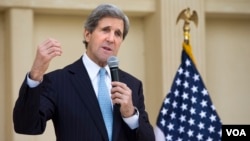BAGHDAD —
U.S. Secretary of State John Kerry is in Baghdad on a previously unannounced trip for talks with Prime Minister Nouri al-Maliki on security in Iraq and war in neighboring Syria.
Senior State Department officials say Secretary Kerry's goals here involve engagement: getting Prime Minister Maliki to engage with the U.S. on Syria and getting him to engage with political opponents in Iraq ahead of April elections.
The prime minister has made clear his interest in the outcome of the Syrian conflict. But U.S. officials say Secretary Kerry will tell him that joining conversations about Syria's future "makes no sense" while Iraq continues to allow Iran to fly weapons and fighters to Syrian President Bashar al-Assad.
A senior State Department official says Kerry will be very direct about stopping or at a minimum inspecting each of those Iranian flights over Iraqi airspace - the scale of which U.S. officials say indicates that they can not be entirely humanitarian.
Prime Minister Maliki previously agreed with Secretary of State Hillary Clinton to inspect those flights, but U.S. officials say only two Iranian flights have been inspected since July. They say both were found to be carrying humanitarian supplies.
Internal problems remain in Iraq
Ten years after the invasion to topple Saddam Hussein, U.S. influence in Iraq appears eclipsed by Iran as Prime Minister Maliki backs Syrian President Assad, and his Shi’ite supporters dominate Sunni and Kurd opponents.
U.S. officials say Kerry will urge the prime minister to ensure that all elements of Iraqi society feel free to participate in upcoming provincial elections. He will also suggest that the Maliki Cabinet reconsider its decision to delay voting in two largely-Sunni provinces over concerns about security for poll workers.
In talks with the Sunni speaker of parliament, Osama Abdul Aziz al-Nujayfi, U.S. officials say Kerry will tell him it is far better to engage with the Maliki government, that he probably could have prevented the delay of voting in Sunni provinces if Sunnis had been part of the Cabinet.
Senior State Department officials say Secretary Kerry's goals here involve engagement: getting Prime Minister Maliki to engage with the U.S. on Syria and getting him to engage with political opponents in Iraq ahead of April elections.
The prime minister has made clear his interest in the outcome of the Syrian conflict. But U.S. officials say Secretary Kerry will tell him that joining conversations about Syria's future "makes no sense" while Iraq continues to allow Iran to fly weapons and fighters to Syrian President Bashar al-Assad.
A senior State Department official says Kerry will be very direct about stopping or at a minimum inspecting each of those Iranian flights over Iraqi airspace - the scale of which U.S. officials say indicates that they can not be entirely humanitarian.
Prime Minister Maliki previously agreed with Secretary of State Hillary Clinton to inspect those flights, but U.S. officials say only two Iranian flights have been inspected since July. They say both were found to be carrying humanitarian supplies.
Internal problems remain in Iraq
Ten years after the invasion to topple Saddam Hussein, U.S. influence in Iraq appears eclipsed by Iran as Prime Minister Maliki backs Syrian President Assad, and his Shi’ite supporters dominate Sunni and Kurd opponents.
U.S. officials say Kerry will urge the prime minister to ensure that all elements of Iraqi society feel free to participate in upcoming provincial elections. He will also suggest that the Maliki Cabinet reconsider its decision to delay voting in two largely-Sunni provinces over concerns about security for poll workers.
In talks with the Sunni speaker of parliament, Osama Abdul Aziz al-Nujayfi, U.S. officials say Kerry will tell him it is far better to engage with the Maliki government, that he probably could have prevented the delay of voting in Sunni provinces if Sunnis had been part of the Cabinet.




